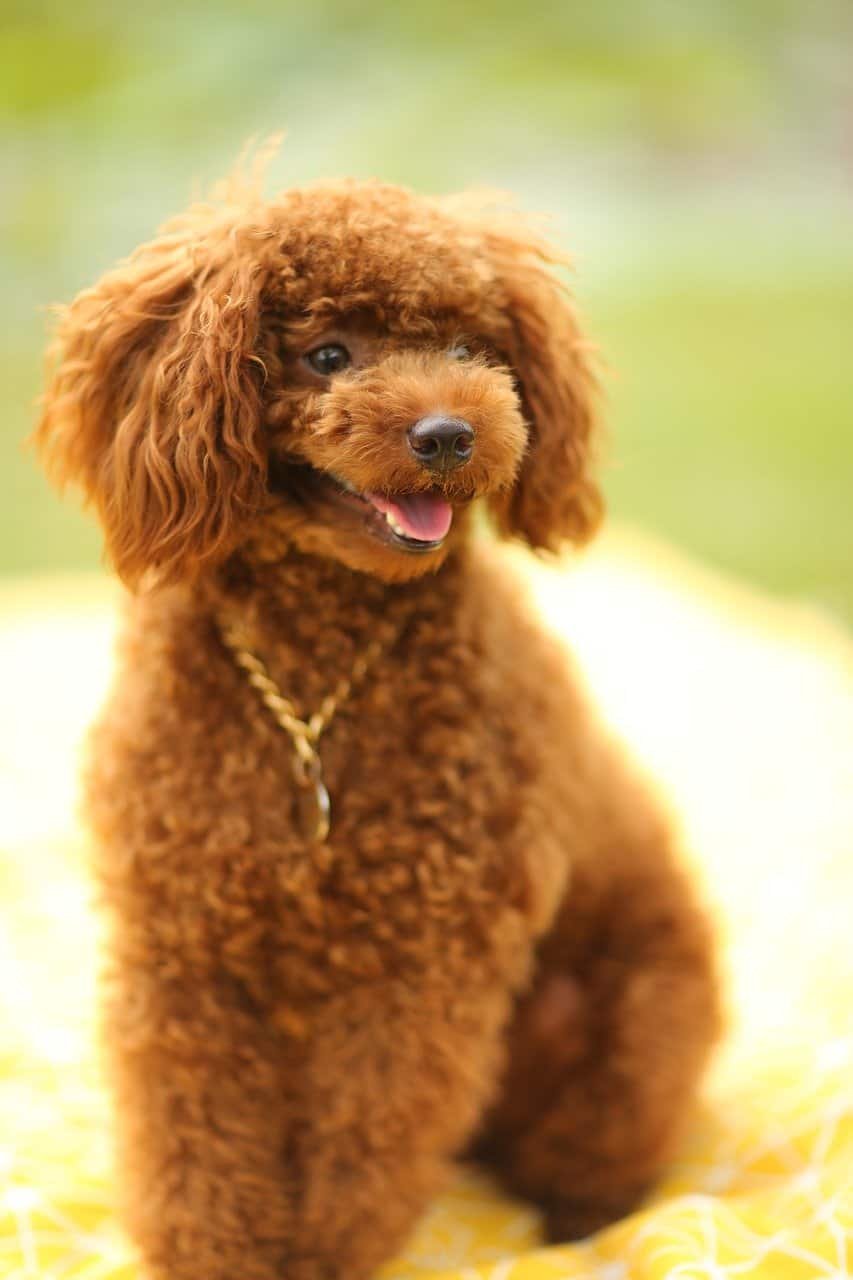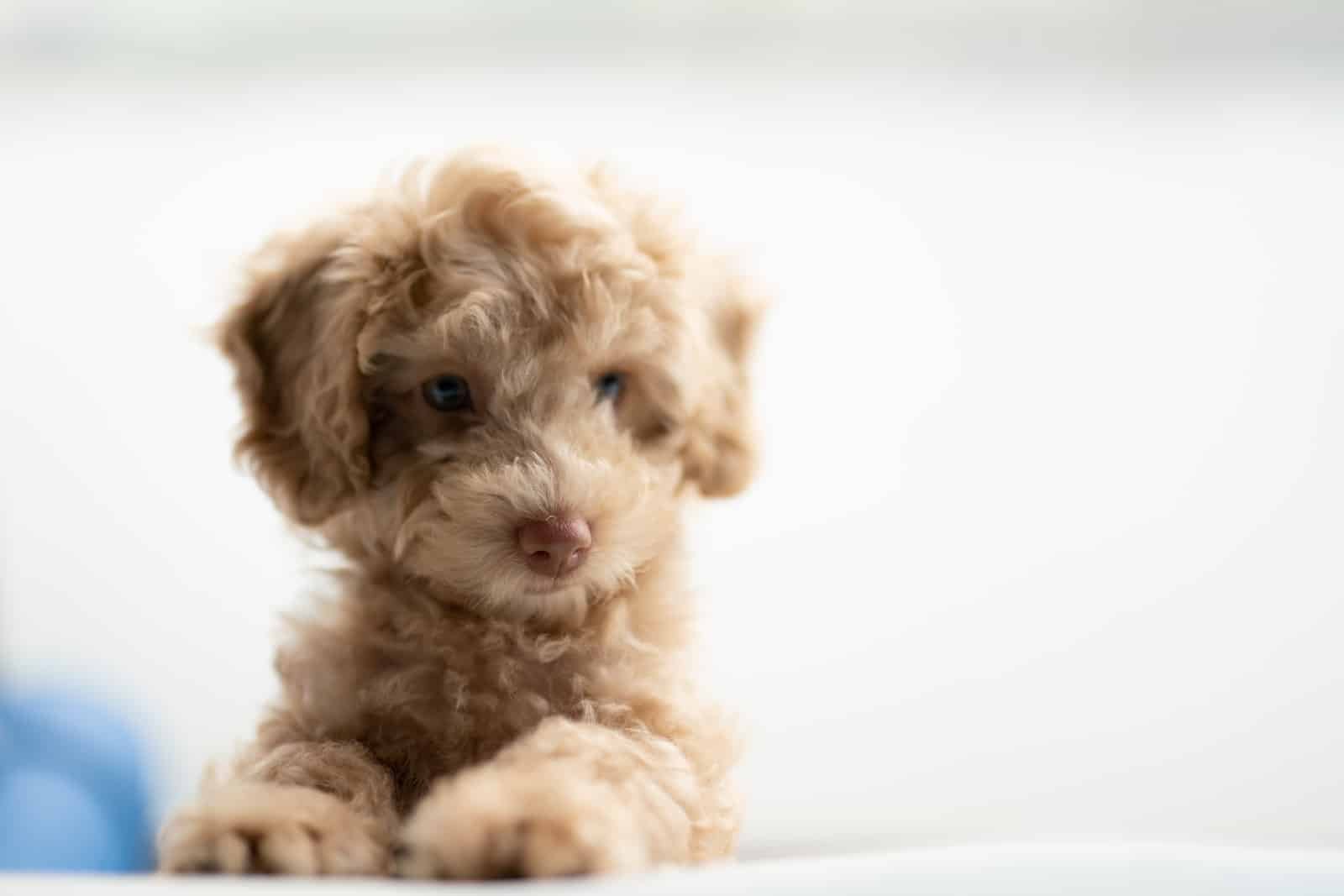
Ready to learn more about the poodle temperament? You’re in the right spot. Poodles, whether they’re toy poodles, miniature poodles, or standard poodles, come packed with an array of personality traits that make them a popular dog breed choice for families, individuals, and even those with allergies. And when it comes to intelligence, they’re an exemplary representation, consistently ranking as one of the smartest dog breeds.
Poodles require regular exercise and mental stimulation to maintain their active and athletic nature. Their energy level scales with their sizes, with the toy and miniature poodles being less active than the larger standard poodle. But no matter the size, this alert breed is always ready for a game of fetch or an agility class due to their bird hunting lineage.
Understanding more about this breed’s temperament is essential to ensuring a happy life with your poodle. This intelligent breed will thrive with consistent training, agility competitions, and daily grooming – one of this breed’s traits. Despite originating as cold water retrievers, nowadays, they prefer being the center of attention in your human family. Their playful nature and people-pleasing disposition make them an excellent choice for a family pet.
Related Reading: Training Rescue Poodles – Rehabilitation Behavior Guide
About This Guide
- Real Experience: Written by poodle enthusiasts with years of hands-on experience caring for and training poodles.
- Expert Reviewed: Content verified by certified dog trainers and veterinary professionals.
- Fact-Checked: Information sourced from the AKC, veterinary journals, and breed specialists.
- Last Updated: November 2025
Understanding the Poodle Breed
When you think of poodles, a vision of elegance, intelligence, and versatility likely comes to mind. There are three main types: the Standard Poodle, Miniature Poodle, and Toy Poodle. Each type is different in size but they share the same breed traits which make them one of the most popular dog breeds in the world.
Whether you’re looking at a towering Standard Poodle or a petite Toy Poodle, expect loads of energy from this intelligent breed. Requiring daily exercise and mental stimulation, a walk around the block just won’t cut it. These dogs love activities like a game of fetch, highlighting their bird hunting history, or an agility course that pushes their athleticism and intelligence to the limits.
Holistic health also plays a huge role when considering a poodle as a family pet. These dogs are generally sturdy but like any other breed, they are prone to certain health issues. Standard Poodles, for instance, are known to have a predisposition to hip dysplasia, a genetic condition which can inhibit movement and cause discomfort. Miniature Poodles and Toy Poodles, on the other hand, are more susceptible to a neurological disorder known as Legg-Calve-Perthes disease or a skin condition called sebaceous adenitis.
Each poodle, whether a Miniature, Toy, or Standard, is unique, but one common thread amongst them all is their eagerness to please, a key poodle temperament trait. This people-pleasing nature goes hand-in-hand with their level of intelligence, making them highly trainable. Consistent training, possibly combining obedience training and positive reinforcement methods, will enhance their people skills and help them shine in any family.
However, be prepared for the grooming demands of a poodle. With their curly coats, they demand daily grooming to avoid matting and tangling. One perk of this breed is that they’re a great choice for persons with allergies due to their low-shedding coat.
There’s no escaping the fact that poodles are an active breed, but exercise alone won’t satisfy them. They also need mental stimulation, a job, or role to fill within their human family. Their instinctive alertness makes them also an excellent choice for a therapy dog role.
To summarize, whether you’re considering a standard, toy, or miniature poodle, understanding the breed’s vitality, intelligence, and aesthetic needs is crucial. Alongside this, bearing in mind potential health conditions, will aid you in ensuring your poodle, regardless of type, lives a fulfilling and happy life.
Temperament Traits of Poodles
Poodles, be it the standard poodles, the miniature poodles, or the tiny toy poodles, are universally recognized for their impressive level of intelligence. Known as one of the smartest dog breeds, they exhibit a zest for life that’s powered by their keen intellect and sharp instincts. A poodle’s temperament is a delightful concoction of the breed’s personality traits, each variant bringing its own unique qualities to the table.
A standard poodle, for instance, is an alert breed that craves mental stimulation—be it through a challenging game of fetch, or mastering an agility course. They are an active breed, needing regular exercise to satisfy their high energy level. The athletic breed, standing up to 22 inches tall, is also a popular choice for people with allergies due to their hypoallergenic fur.
Contrarily, the miniature and toy poodles portray a more laid-back lifestyle. Though their size may be small, their spirit is anything but. They love the center of attention and exhibit a notable people-pleasing nature that wins them a place in many human families.
However, their playful nature and intelligence come with a caveat. Poodles, irrespective of their type, require consistent training. They are fast learners, which coupled with their obedience, makes them ideal for participation in agility competitions. Trust us, that daily exercise keeps them happy, healthy, and prevents weight gain.
Like other purebred forms, poodles aren’t without certain health issues. Hip dysplasia and sebaceous adenitis—a life threatening skin condition—are a couple of risks. Also, Addison’s disease, a condition resulting from the insufficient production of adrenal hormones, is another threat. But don’t fret—most of these conditions are manageable, if not completely avoidable, with regular checkups and diligent care.
Poodles, originally bred as water retrievers and for bird hunting, have the hunting instinct ingrained in them. Yet, they exhibit remarkable therapy dog traits, comforting and bringing joy to many.
To conclude, whether you’re considering a majestic standard poodle or a spunky toy poodle, understanding their temperament is key to ensure a happy life with your potential four-legged family member. These intelligent, energetic, and loyal dogs are a popular breed. They might need lots of grooming and a bit more attention than an average dog, but their affectionate, playful nature makes them an excellent choice for a family pet.
With precise training, regular mental stimulation, and enough room to dispense their high energy level, yours will be a satisfying journey with these delightful dogs. Poodle temperament is indeed a dynamic mix of traits that embodies a delightful dog experience. They’re more than just a popular dog breed—they are soulful companions, ready to enrich your life.
Intelligence and Poodle Temperament
If there’s one aspect of poodle temperament that can’t be overemphasized, it’s their outstanding intelligence. Coming in three sizes, Standard Poodles, Toy Poodles, and Miniature Poodles, they all heavily feature this admired trait. Their sharp minds require mental stimulation to keep them happy and content. So it’s not surprising that a popular game for these breeds is a brain-tickling game of fetch.
Commonly known as one the smartest dog breeds around, Standard Poodles thrive on learning. That’s why obedience training for these poodles isn’t just recommended — it’s essential. With the right amount of positive reinforcement, you’ll have a dedicated, alert breed, always eager to please their human family.
Your Miniature Poodles and Toy Poodles may not be as physically imposing as their bigger cousins, but don’t let their smaller size fool you. These poodles retain their agility and intelligence. Quick to learn and packed with a playful nature, they make excellent family pets. And their compact size doesn’t mean they lack in energy. They’re just as active and will need regular exercise to keep them in high spirits.
And what about those health issues? Poodles, regardless of type, can experience a range of genetic conditions. While some, like hip dysplasia and sebaceous adenitis (a skin disease), may require medical attention, you’ll find that most mini and toy poodles are generally healthy with the right care.
It’s clear: with the intelligence level Poodles offer, their breed traits make them a favorite. Yet, space for them to exert their athletic energy and turn their agile minds is essential too. By keeping them mentally and physically engaged, you’re ensuring that your Poodle lives a vigorous, happy life.
While each type – from the Standard to the Toy – has its own unique personality traits, Poodles as a whole are without a doubt an intelligent breed. With the right training and love, your Poodle will not disappoint. Whether it’s running an agility course with a Miniature Poodle, or playing with a Toy in the garden, nurturing their intelligence will always bring out the best in them.
Understand, ultimately, that intelligence and activity levels go hand in hand for this beloved breed. So don’t hesitate to exercise their minds as much as their bodies. This will ensure you have a happy, healthy Poodle as part of your family.
Poodles’ Energy Levels and Its Impact on Temperament
You’re seeking to understand poodles’ energy levels and how it impacts their temperament, aren’t you? Let’s talk about this incredible breed.
A lot has been said about poodles, popular dog breed in the US, and their seemingly endless supply of energy. Without wondering too much, we could see the toy poodles zipping around the house, miniature poodles playing tirelessly with kids, or standard poodles enthusiastically engaging in a game of fetch.
There’s no denying that across all three variants – toy, miniature, and standard poodle – they display a high energy level. This active nature makes them a delight to families and individuals who enjoy keeping up with a vibrant family pet.
Why are poodles so energetic? It’s simple. They were originally bred as water retrievers for bird hunting, which requires intelligence, alertness, and agility. This breed trait continues to play out in the form of their energy and enthusiasm, whether they’re engaging in an agility course or acting as showpieces in an agility competition.
A poodle’s energy level doesn’t just keep them on their toes, but mental stimulation is necessary for this intelligent breed. Poodles are regarded as one of the smartest dog breeds, and a steady flow of activities helps them use their intellectual abilities to the fullest. Ignoring their intellectual needs can lead to unwanted behaviors out of boredom.
Regular training and daily exercise are essential for a poodle’s happy life. Depending on the poodle type, whether it’s a toy or standard poodle, the activity levels may vary, but the need for physical and mental engagement remains the same.
While poodles are known for their high energy levels, it’s also vital to recognize that every dog has its personality trait. Much like humans, poodles possess individual temperaments, some might display more energy and others less.
By understanding your poodle’s energy and activity level, you’re better positioned to give them the care and engagement they need. Endearing as their energy might be, remember to strike a balance and ensure they get adequate rest.
Poodles, with their consistency, can serve as therapy dogs, competently deal with complex tasks, or be the happy, energetic center of your family. The key to nurturing these pets lies in acknowledging their unique energy levels and providing consistent training, engaging activities, and loads of love. Trust me, they’ll return the favor tenfold with their people-pleasing nature and playful antics.
So, whether you’re a current pet owner considering adopting a poodle or you’re planning to participate in a breed selector quiz, knowing about their energy level and its impact on their temperament helps in shaping a fulfilling bond.
Social Behavior of Poodles
A fascinating exploration into the world of poodles, your journey begins by understanding their social behavior. These elegant four-legged creatures, whether standard poodles, toy poodles or miniature poodles, are well-regarded for their social savvy.
Poodle temperament shines through their social grace, along with a level of intelligence that makes them one of the smartest dog breeds. They’re an alert breed with a people-pleasing nature, making them a popular choice for families. Poodle type doesn’t influence their social prowess. From the tiniest toy poodle to the more robust standard poodle, their behavior remains consistently sociable and engaging.
Poodles crave mental stimulation and daily exercise. Their energy level mirrors their activity level, meaning that the more active you keep your poodle, the happier they will seem. Regular exercise is not just a hobby; it’s essential. Without it, poodles risk weight gain and its attendant health issues. That’s why they love games such as fetch, revealing their bird hunting instincts. Agility classes, too, match well with this athletic breed.
Poodles, due to their high intelligence, respond favorably to consistent training. Positive reinforcement works best with their playful nature. Whether it’s a new game for hunting, an agility competition, or simply mastering a new trick, their obedience training benefits from your enthusiastic participation.
Beyond intelligence and play, the poodle’s social behavior extends to their role as a family pet. They thrive on being the center of attention, integrating seamlessly into the human family. Given their coats, people with allergy often find poodles compatible. However, be prepared for lots of grooming, with professional help often required.
Whether it’s the standard poodle or the tiny toy poodle, their social behavior is indicative of their alert breed trait. These dogs flourish with activity and attention, eagerly adapting to their family’s lifestyle. Their people-pleasing nature, intelligence, and joy make the poodle an ever-popular dog breed. Remember, though, they’re an active breed, requiring mental engagement and daily exercise. If you can provide these, then you’ll secure a happy life for your poodle – and countless fond memories for yourself.
How Training Influences a Poodle’s Temperament
An exclusive peek into understanding how training plays a crucial role in molding a poodle’s temperament! Let’s dive into the core factors that shape the temperament of these intelligent poodle breeds – standard poodles, toy poodles, and miniature poodles.
With remarkable level of intelligence and an alert nature, every poodle type is highly trainable. A consistent training regimen greatly impacts the over-all breed trait, and ultimately, the individual personality trait.
Start obedience training early and target the energetic disposition of these popular dog breeds. The fundamental rule with training a poodle – whether it’s a standard poodle or a miniature poodle – is to ensure you accommodate mental stimulation and daily exercise. Poodles need it, owing to their energy level and athletic build that traces back to their historical purpose as water retrievers and bird hunters.
Regular exercise helps manage their activity level, keep their agile minds sharp, and maintain average weight. Moreover, daily grooming – whether lots of grooming at home or periodic professional grooming – checks for common health issues like skin diseases, also keeping potential ear canal issues at bay caused due to hair accumulating in the poodles’ uniquely built ears.
Remember, these breeds have a serious people pleasing nature. They desire to be the center of attention and part of their human family. You can use this intrinsic, playful nature for positive reinforcement during training. Whether it’s a game of fetch tapping into their hunting instinct or a complex activity on an agility course, success in the task often serves as its own reward for these smartest dog breeds.
Another crucial factor to consider is the potential risk of certain genetic conditions that this breed might inherit, such as hip dysplasia and sebaceous adenitis. A health condition could bog down your poodle, making them less receptive to training and potentially leading to behavior changes. Thus, regular vet check-ups are essential to ensure your poodle leads a happy life and stays on top of their training regimen.
Training influences a poodle’s temperament by not only honing their intelligence and energy but also by integrating them as a family pet. Every standard, toy, or miniature poodle can be an exceptional choice for family, especially for people with allergies, given the poodle’s hypoallergenic feature. Just bear in mind, the earlier and more consistent the training, the better rounded your poodle’s temperament is likely to be.
Poodles’ Temperament with Families and Other Pets
With their playful nature and intelligence, poodles have rightly become a popular breed for families and households with other pets. Known for their people-pleasing nature, from the Toy Poodle to the Standard Poodle, this breed radiates a friendly disposition that never fails to capture hearts.
A Poodle’s temperament with families Whether you’re considering a Standard Poodle, a Miniature Poodle, or a Toy Poodle, it’s well worth noting that all types are generally great with kids and integrate well into family life. Blessed with intelligence and alertness, they’re quick to become part of the family. With consistent training and lots of attention, your poodle may very well transform into the perfect family pet, as delighted to participate in a game of fetch as they are to curl up next to you on the couch.
Poodles and other pets Are you worried that your active breed poodle won’t get along with your other pets? Not to fear. With their innate bird hunting instincts, poodles are an athletic breed, built with a tenacity that complements their affable nature. However, their hunting history doesn’t necessarily confer a problem for your other pets. With the right introductions and a bit of patience, poodles have been known to mesh well with other domestic animals, particularly when they’ve been raised together.
The importance of mental stimulation and exercise Don’t let their fluffy coats fool you. At their core, poodles are an intelligent breed, prone to boredom if not provided with the right level of mental stimulation and regular exercise. Their active and athletic temperament means they’re best suited to families that can provide them with plenty of opportunities for play and exercise. Regular walks, games and even participation in agility competitions have proven beneficial for this energetic breed.
Health issues and personality traits Despite their friendly temperament and numerous desirable breed traits, poodles do face certain genetic conditions which could potentially influence their behavior. These include hip dysplasia and sebaceous adenitis, a skin condition causing flaky skin and hair loss. But with early detection and regular vet check-ups, many poodles can lead long, happy lives with their human families.
In the end, poodles have proven to be a perfect choice for families and homes with other pets, provided they’re given due attention, care, and mental stimulation. Understanding the Poodle temperament and catering to their needs accordingly can result in a harmonious and joyful home filled with love for this stunning breed.
Factors Affecting a Poodle’s Temperament
As poodles have taken the spot as one of the most popular dog breeds globally, it’s natural to be curious about their temperament. However, what shapes a poodle’s personality isn’t merely their fur shade or size; several factors can influence the temperament of your toy poodles, miniature poodles, or standard poodles.
The poodle breed, renowned for their high level of intelligence, derive their energy and playfulness from their ancestors who served as water retrievers and bird hunters. This hunting instinct often manifests in a game of fetch or as an intense focus on small, moving objects. Still, their alert breed trait and activity level require not just physical but also mental stimulation. Regularly engaging their intellectual capacity can lead to an alert, content, and well-behaved family pet.
Consistent training from a young age shapes the breed’s temperament considerably. Poodles are an intelligent breed, receptive to obedience training with positive reinforcement methods winning their cooperation. This intelligent breed stands out in agility competitions; they swiftly master the agility course, a testament to their athletic disposition. Their people-pleasing nature results in exceptional performance as a therapy dog, making them a great choice for a family.
Poodles, like any other breed, are susceptible to certain health issues. Genetic conditions such as sebaceous adenitis, a skin condition, or hip dysplasia, can affect their temperament and general comfort. Poodles may also suffer from insufficient production of adrenal hormones, a condition requiring strict attention to diet and exercise. Managing these conditions early can significantly impact your poodle’s happiness and longevity.
While the genes play a role in your poodle’s temperament, their environment impacts their behavior too. Owing to their people-pleasing nature and athletic breed, they crave attention and require daily exercise. Lack of activity results in unhappiness, and could potentially lead to weight gain. On the other side, a home that provides plenty of exercise and care helps the breed thrive.
Your poodle’s temperament is a unique mix of their breed traits, training, health, and environment. Understanding these factors can ensure a happy life for your poodle and a strong bond between you and your furry friend. Let’s not forget, these energetic canines aren’t just satisfied being a pet, they’re happiest when they’re part of the human family.
Managing and Nurturing Your Poodle’s Temperament
Understanding your poodle’s temperament is a key aspect of nurturing a happy and fulfilled companion. Poodles, including toy, miniature, and standard poodles, are highly intelligent breeds with specific needs when it comes to mental stimulation and daily exercise.
Being an intelligent breed, mental stimulation is crucial for poodles. They thrive with puzzles, interactive games, obedience training, and even agility courses. Regular exercise is equally important, ensuring their high energy level is well managed. Whether you have a toy poodle or a standard poodle who’s a few inches tall, remember their roots as water retrievers and bird hunting dogs. A good swim or a game of fetch can keep them happily engaged.
Poodles, regardless of variety, are popular dog breeds known for their people-pleasing nature, alertness, and agility. Consistent training using positive reinforcement techniques, paired with their endearing, playful nature, makes them a great choice for family pets. Whether part of a human family, or acting as a therapy dog, the poodle’s hearty personality trait shines.
All poodles require daily grooming, which is more demanding with certain types like the miniature and toy poodles. If you’re not up to it, professional grooming is always an option. Here, your focus should be detecting any signs of sebaceous adenitis, a skin disorder common amongst poodles, early. Taking meticulous care of the ear canal is equally crucial, ensuring no trapped moisture leads to infection.
Poodles are generally healthy, but certain genetic conditions like hip dysplasia and adrenal hormone insufficiency are common. Regular vet checkups can help manage these health issues effectively, ensuring that your poodle leads a happy life. Remember, early detection of conditions like gum disease and neurological disorders can lead to effective treatment.
As a pet owner, being sensitive to their needs, offering lots of love, and adopting effective training techniques will help manage and nurture your poodle’s temperament. In return, you’ll have an intelligent, loving, and playful companion. Let’s not forget, their hypoallergenic coat makes them an excellent choice for persons with allergies.
Knowing about poodle temperament and health risks can help create a happy environment for this smart and agile breed. They truly are a delightful blend of beauty, brains, and athletic prowess, making them an amazing family pet or therapy dog.
Conclusion: Summing Up Poodle Temperament
Now that we’ve explored poodles, you should have a good understanding of their temperament. From the agile and mighty standard poodles to the cuddly character of toy poodles, it’s easy to appreciate why they’re a popular dog breed.
Poodles require both mental stimulation and daily exercise to stay fulfilled and happy. By playing fetch, doing agility courses, or giving challenging treats, you’re meeting their energetic needs.
One of the many reasons poodles are a favorite as a family pet is their people-pleasing nature. These breeds are highly intelligent and obedient, with consistent training and positive reinforcement. It’s not just about being smart, it’s about their genuine desire to make their human family happy.
That’s not to say owning these lovable breeds doesn’t come without challenges. Poodles can have health issues like hip dysplasia, sebaceous adenitis, and blood disorders. Regular check-ups and a keen eye can aid in early detection and treatment.
Their fur is as unique as the breeds themselves. For people with allergies, the low-shedding hair is an absolute blessing. But, remember, those beautiful curls require daily grooming. For those who aren’t up to the task, professional grooming can ensure your poodle remains stylish and healthy.
While poodles are fantastic companion dogs, they’re also true to their bird hunting and water retriever roots. An active breed, they relish time spent outside. Whether its cold water or agility competitions, there’s no denying their athleticism.
Above all, the enchanting poodle temperament gravitates towards love, companionship, and dedication. Choosing any type of poodle means adding a loving and smart member to your family. Characterize these breeds by their level of intelligence or their obedience training prowess. You’ll love their people-pleasing, playful nature that makes them popular with families everywhere.







